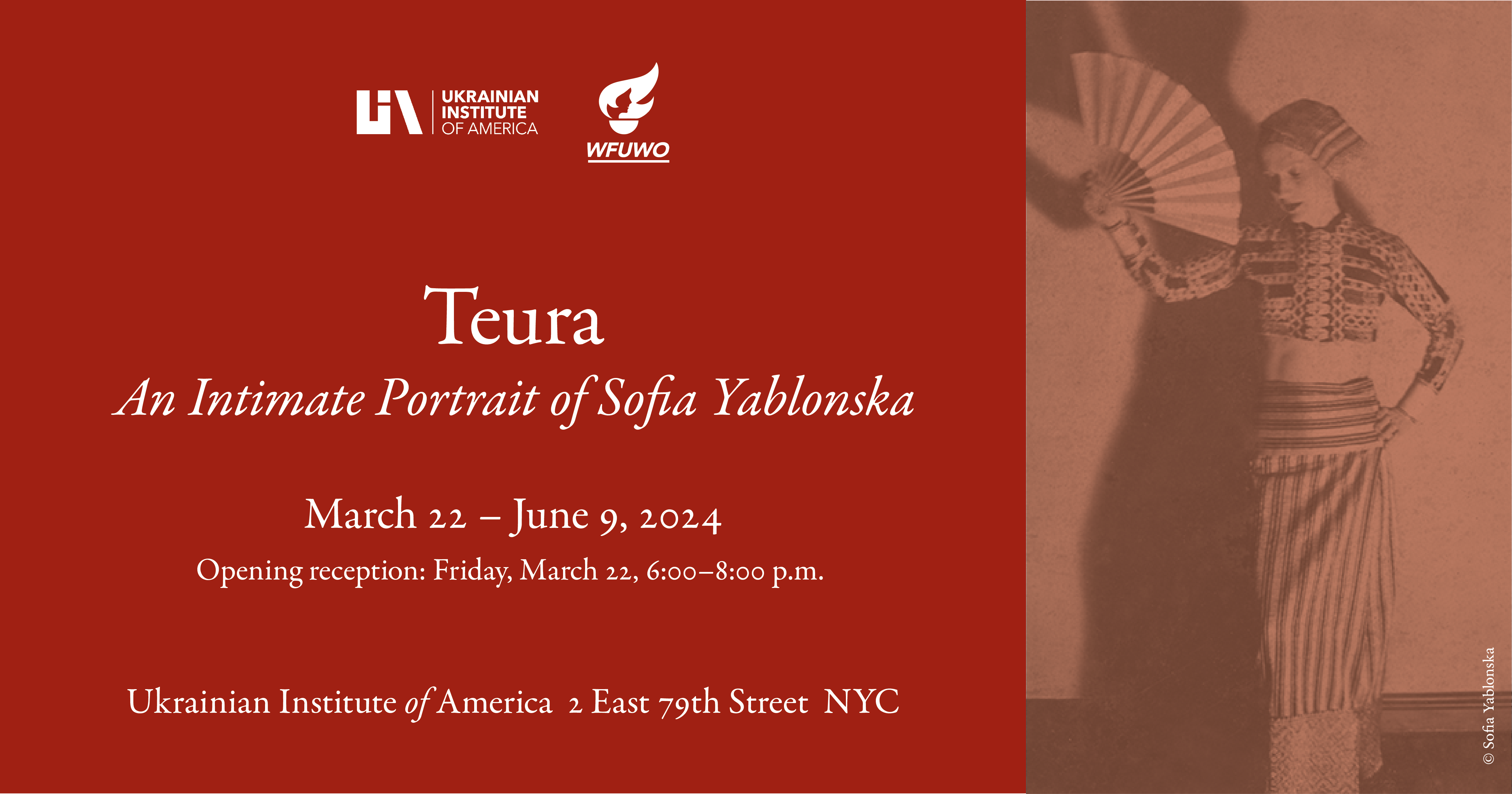
- This event has passed.
Teura: An Intimate Portrait of Sofia Yablonska
March 22, 2024 @ 12:00 pm - June 16, 2024 @ 6:00 pm

The Ukrainian Institute of America and the World Federation of Ukrainian Women’s Organizations are pleased to present Teura: An Intimate Portrait of Sofia Yablonska, a multi-media exhibition celebrating the life and spirit of Ukrainian writer, cultural commentator, photographer, cinematographer, and champion of the women’s movement in the interwar years, Sofia Yablonska (1907-1971). The first display of its kind in the U.S., this installation includes photographs by and of Ms. Yablonska, video footage, notebooks and journals, object culture that accompanied her during distant travels, as well as costumes owned and worn by her.
From her introduction to the exhibition, Olena Haleta, PhD, observes, “Sofia Yablonska was concerned with the issue of women’s perspective and voice … and created a new behavioral model for women, encouraged them to dream and act. She was aware not only of the limitations, but also of the opportunities that opened before her as a woman, and bravely took advantage of them, entering places inaccessible to male travelers.” Ms. Yablonska maintained active relations with leading representatives of the women’s movement in Galicia, and published her travelogs and reports in women’s magazines, in particular, in Zhinocha Dolia and Nova Khata.
“What’s more, photography gave [Yablonska] the opportunity to change the direction of the gaze: thanks to the ‘hidden camera’ technique, [she] captured the emotions on the faces of viewers interested in photographs of European achievements and inventions, and thus changed the relationship between object and subject. [Thus] she managed to go beyond the ‘oriental trap’, egocentrism and ethnocentrism. In this, she was helped by her own atypical situation, her awareness of herself as a European — a representative of Western culture associated with a position of strength and power, and at the same time as a Ukrainian — a representative of a subordinate and oppressed community.”
Sofia Yablonska was born in a village near Lviv, into a family of a Greek Catholic priest. She moved frequently during her childhood, living in various places such as Kyiv, Novorossiysk, the Sea of Azov, Rostov, and Taganrog. From 1924 to 1925, she studied at the Drama School in Lviv while successfully managing two cinemas in Ternopol. This allowed her to save enough money for a trip to Paris, where she tried her luck in several films. In France, she met Stepan Levynsky, a traveller and writer who inspired her passion for “exotic lands.” Paris did not hold her for long, and by the end of 1928, she decided to travel to Morocco on her own. After returning from Morocco and a brief stop in Paris, she settled in Krynica-Zdrój, where she started a small business. Despite her entrepreneurial duties, she found time to pursue her hobby — photography.
In December 1931, she began her dream journey around the world. Destiny brought her to Indochina, where she crossed paths with her future husband, Jean Oudin, a French engineer. Continuing her global expedition, Yablonska travelled to Siam (now Thailand), Malaysia, Java, Bali, Australia, New Zealand, and Tahiti. In October 1934, she arrived in New York, marking the end of her journey.
Afterwards, Sofia was welcomed in her creative community as a star and was invited to many public meetings and presentations. As a woman who independently circumnavigated the globe and immortalised her experiences in her writings, she became a sensation in the still largely patriarchal Galicia of the 1930s. Despite an overwhelming number of household duties, Yablonska started another project: from 1936 to 1937, she ran a beauty column in the magazine “Nova Khata,” first titled “It’s Never Too Late” and later “A Few Tips from Klyodina,” where she introduced women to various beauty practices and provided cosmetic advice.
In the 1950’s Yablonska moved to Noirmoutier, an island where she and her late husband desired to live. She worked hard to make this dream a reality by designing and building a beautiful house. During this time, she worked on her greatest work, the psychoanalytical novel “A Book About My Father” which recounted her childhood and how her relationship with her father influenced her evolvement. This book was published after Sofia’s death, thanks to the efforts of Yuriy Stefanyk and Marta Kalitowska. At the age of 64, Yablonska died in a car accident while en route to Paris with her manuscripts.
Books authored by Sofia Yablonska and well-received during her lifetime include The Charm of Morocco (1932), From the Land of Rice and Opium (1936) and Distant Horizons (1939). Two Weights, Two Measures (1972) and Book About My Father: From My Childhood (1977) were published posthumously. A photographic monograph, Teura: Sophia Jablonska was published by Rodovid Press in 2018.
This installation was produced Sofika Zielyk and Andrew Horodysky, with the kind cooperation of Olena Haleta, PhD, Veronika Homeniuk, Lidia Lykhach, Nathalie Oudin, Lubow Wolynetz, and Lydia Zaininger.
Teura: An Intimate Portrait of Sofia Yablonska runs through June 8, 2024.
Image: © Sofia Yablonska, courtesy Nathalie Oudin.
Public hours: Thursday to Sunday, 12:00–6:00 p.m. or by appointment. For further information, please contact the Ukrainian Institute of America at (212) 288-2660 or mail@ukrainianinstitute.org.